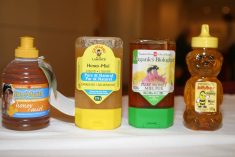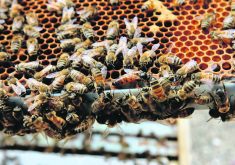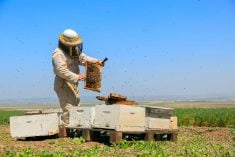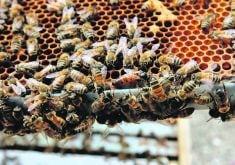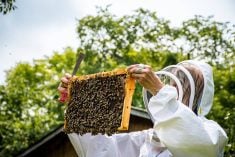A B.C. ag biotech company has an idea to save the bees from colony collapse.
ApiSave, based in Port Coquitlam, recently won investment funding to see their natural bee-boosting product to commercial fruition.
WHY IT MATTERS: Commercial beekeepers in Canada have had a couple of bad winters for bee loss, at least some of which were blamed on or compounded by pests like varroa mite.
Read Also

Manitoba Pork members vote in favour of levy hike
Manitoba Pork Council members have voted in favour of raising its per animal levy.
The company plans to develop its compound into two products. One is an environmentally beneficial organic plant extract intended to improve bee immune systems. The more robust bees would then be better able to fend off pathogens and pests. The other is a pesticide for the bee disease foulbrood and for parasitic varroa mites.
Russ Crawford, the company’s vice-president of business development, described it as “a game-changing, natural product.”
Crawford was pitching the product during the Startup TNT 2025 Spring Agri-Food Investment Summit May 1 in Regina, Sask.
“We’re on a noble mission to save the bees. We have promising test results, strong market interest and broad IP (intellectual property),” he said.
The product’s development was motivated by a high global rate of bee colony collapse.
“Ten years ago, collapse was somewhere between 20 and 40 per cent (worldwide),” said Crawford. “That trend has continued to grow up as high as 62 per cent in the United States this past year.
“It’s a serious and growing problem costing beekeepers about $500 million a year to replace those hives, but the bigger loss is in crop production. We’re losing hundreds of billions of dollars of crop production every year because the bees aren’t there to either pollinate the crops or they’re weaker and they’re not doing as good of a job.”
Those bee losses are happening at the same time as beekeepers have noted a decline in how well go-to bee protection products are working. There has been growing concern that varroa mites may be developing resistance to popular chemical controls, for example.
Crawford said the company plans to use the investment funds to expand field trials, scale up production and expand its intellectual property.
According to its website, Startup TNT is a company that raises money for startups and builds networks of “sophisticated angel investors.”
The May 1 event was also supported by Farm Credit Canada.




